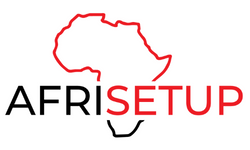- By afrisetupconsultants
- Uncategorized
- 0 Comment
Online business in Tanzania is rapidly emerging as a vital component of the country’s economy, fueled by increasing internet penetration, widespread mobile phone usage, and the rising demand for digital services. Tanzania, with a population of over 60 million people, is experiencing a shift towards digitalization, creating numerous opportunities for entrepreneurs and established businesses to engage in e-commerce, digital marketing and fintech.
Before we dive in, we would like to inform business owners interested in starting an online business in Tanzania that Afrisetup is here to assist you in successfully registering your business in Tanzania from the comfort of your home. Let us help you set up your business while you focus on its growth.

Why Choose Tanzania for Your Online Business?
Choosing Tanzania for your online business offers several strategic advantages:
1. Growing Internet Penetration – Tanzania’s internet usage is expanding rapidly and this number continues to grow. The rise in smartphone usage and improved network infrastructure makes it an ideal environment for online businesses to thrive.
2. Expanding E-commerce Market – E-commerce is gaining momentum in Tanzania, particularly in urban centers like Dar es Salaam. Consumers are becoming more accustomed to online shopping, providing a growing market for various industries.
3. Favorable Government Policies – The Tanzanian government has been supportive of digital transformation. Initiatives like the National ICT Policy promote innovation and encourage the development of the digital economy.
4. Young and Tech-Savvy Population – Tanzania has a youthful population, with over 60% under the age of 25. This demographic is more likely to embrace technology, adopt new trends, and drive demand for digital services.
5. Untapped Market Opportunities – Many sectors, such as online education, fintech, and digital healthcare, are still underdeveloped in Tanzania. Starting an online business in these sectors offers a chance to tap into an emerging market with less competition than more mature regions.
6. Improved Payment Solutions – Tanzania has seen improvements in digital payment systems, including mobile money services like M-Pesa and Tigo Pesa. These services make it easier for businesses to operate and for customers to make payments securely and conveniently online.
7. Strategic Location in East Africa – Tanzania’s location offers access to not just the local market but also the wider East African region. It serves as a gateway to other markets such as Kenya, Uganda, and Rwanda.
Legal Requirements for Starting an Online Business in Tanzania
Starting an online business in Tanzania involves adhering to several legal and regulatory requirements. Below are the key legal considerations you need to address:
ü Business Registration – If you plan to operate under a name other than your own, you must register the business name with the Business Registration and Licensing Agency (BRELA).
ü Tax Identification Number – You will need to obtain a Tax Identification Number from the Tanzania Revenue Authority.
ü Business License – Online businesses, like all businesses in Tanzania, must acquire a business license.
ü Compliance with ICT Regulations – If your online business involves providing digital and e-commerce services, you may need to comply with regulations set by the Tanzania Communications Regulatory Authority.
ü Intellectual Property (IP) Protection – If your online business involves trademarks and logos, it is advisable to protect them by registering with BRELA’s Intellectual Property Department.
Types of Online Businesses in Tanzania
Tanzania offers a wide range of opportunities for online businesses; below are some of the popular types of online businesses in Tanzania:
1. E-commerce Platforms – Online Retail Stores: Selling products online, such as electronics, home goods, and more. Platforms like Jumia and Kilimall have already established a presence.
2. Digital Marketing and Advertising – Social Media Marketing: Managing social media accounts, running ad campaigns, and creating content for businesses looking to reach local and international audiences.
3. Freelance Services – Freelance Writing: Offering writing services for blogs, websites, marketing materials, and more. There is a growing demand for quality content in Tanzania as more businesses go online.
4. Online Education and E-learning – E-learning Platforms: Providing online courses in various fields such as IT, marketing, language learning, and vocational skills.
5. Online Consultancy Services – Business Consulting: Providing specialized business advice and solutions online, including management consulting, HR consulting, and financial planning services.
6. Fintech (Financial Technology) – Mobile Payment Solutions: Tanzania is a mobile money leader in East Africa with platforms like M-Pesa, Airtel Money, and Tigo Pesa.
7. Online Travel and Tourism Services – Booking Platforms: Providing online hotel booking, tour packages, and travel experiences for tourists visiting Tanzania. The tourism sector remains one of the largest industries, and online platforms can streamline services.
8. Online Health Services – Telemedicine: Offering online medical consultations, appointments, and remote diagnoses through apps or websites. This is particularly useful in rural areas with limited access to healthcare.
9. Online Real Estate Platforms – Platforms that allow property owners and real estate agents to list their properties for rent or sale, helping users find homes, offices, or land.
Ø Afrisetup is here to assist you in identifying the best online business suited for you; we will provide you with the guidance needed to make the best choices. Contact us today.
Essential Steps to Start an Online Business in Tanzania
Starting an online business in Tanzania involves a step-by-step process to ensure that your business operates legally. Here’s a comprehensive guide on how to register an online business in Tanzania:
1. Identifying Your Niche and Target Market – A successful online business begins with selecting the right niche. Identify market gaps where your business can offer unique value. Conduct market research to understand the demands, preferences, and spending behavior of Tanzanian consumers to effectively target your audience.
2. Creating a Business Plan – A solid business plan outlines your goals, target audience, pricing strategies, and projected financials. It helps you stay organized, secure investors if needed, and acts as a roadmap for your business journey.
3. Registering Your Online Business – Official registration is essential for building credibility and operating legally in Tanzania. Afrisetup is here to assist you!
What are the tax requirements for online businesses in Tanzania?
Before starting an online business in Tanzania, keep these key tax requirements in mind:
1. Tax Identification Number – All businesses in Tanzania, including online businesses, are required to obtain a Tax Identification Number from the Tanzania Revenue Authority.
2. Corporate Income Tax – Resident Companies: The corporate income tax rate for businesses incorporated in Tanzania is 30%on taxable profits.
3. Value Added Tax – Businesses are required to register for Value Added Tax which is at 18%.
4. Withholding Tax – Certain payments made by businesses are subject to withholding tax, which the payer must deduct and remit to the TRA. These payments include:
o Dividends: Withholding tax on dividends is 10% for residents and 15% for non-residents.
o Royalties: A 15% withholding tax is applicable on royalty payments to non-residents.
o Consultancy and Professional Fees: A 5% withholding tax applies to payments made to resident professionals, while 15% applies to non-residents.
5. Pay As You Earn – If your online business employs staff, you are required to deduct Pay As You Earn from employee salaries and remit it to the TRA.
6. Social Security Contribution – Online businesses that employ staff must also contribute to the National Social Security Fund.
7. Excise Duty – Certain digital services and telecommunications-related businesses, such as mobile money services, online gaming, and digital advertising, may be subject to excise duty.
8. Stamp Duty – Stamp duty applies to specific documents, such as legal contracts, leases, and company share transfers. If your online business engages in activities that require such documents, stamp duty may be applicable.
10. Filing and Compliance – Businesses are required to submit annual corporate income tax returns to the TRA. The tax year in Tanzania runs from January 1 to December 31, and tax returns are typically due within six months after the end of the financial year.
Opportunities in the Tanzanian Online Market
Below are key opportunities for businesses looking to tap into the online space in Tanzania:
1. E-commerce and Online Retail – Growing Online Shopping Demand: With the increasing use of smartphones and internet access, consumers are more inclined to shop online for convenience.
2. Fintech and Mobile Payments – Mobile Money Services: Tanzania has a well-established mobile money infrastructure with platforms like M-Pesa and Airtel Money. Fintech solutions that offer seamless payment systems and micro-lending can thrive by leveraging this ecosystem.
3. Online Education and E-learning – Skills Development Platforms: With a large youth population seeking to improve employability, online platforms offering courses in IT, business, language learning, and vocational skills are in high demand.
4. Digital Marketing and Advertising – Social Media Marketing: As more businesses look to establish an online presence, the demand for social media management, digital advertising, and content creation services has grown significantly.
5. Online Travel and Tourism – Booking Platforms: Tanzania is a top tourist destination with attractions like Mount Kilimanjaro and Zanzibar. Offering online services that make booking accommodations, safaris, and tours easier is a promising business area.
6. Telemedicine and Online Health Services –
Telehealth Platforms: Given the challenges of accessing healthcare in rural areas, there are opportunities to offer telemedicine services that connect patients with doctors for virtual consultations.
7. Logistics and Delivery Services – Last-Mile Delivery: As e-commerce grows, so does the need for reliable logistics and delivery services, particularly for the “last mile” — delivering products from local warehouses to customers’ doorsteps.
8. Agri-tech Platforms – Marketplaces for Farmers: Online platforms that connect farmers with buyers, both locally and internationally are in demand.
9. Freelance and Gig Economy Platforms – Freelance Marketplaces: As internet access improves, Tanzanian professionals in fields like graphic design, content writing, and web development are increasingly looking for freelance work.
10. Online Real Estate Platforms – Property Listings: Real estate platforms that allow users to search for rental properties, land, and homes for sale have a growing market in urban areas. Providing transparency and ease of search.
FAQs
Do I need a business license to start an online business in Tanzania?
Yes. To operate legally, you will need a business license and registration with BRELA. Some businesses may also need additional permits depending on their specific industry.
How much capital is required to launch an online business in Tanzania?
Capital requirements vary widely depending on the type and scale of your business. Basic e-commerce setups can start with minimal investment, while more extensive operations require more capital.
Conclusion
Starting an online business in Tanzania offers exciting opportunities in a rapidly expanding market. As Tanzania continues to move towards a more digitalized economy, online business will play a crucial role in shaping the future of trade, employment, and innovation in the country. Entrepreneurs who seize these opportunities and adapt to the evolving digital landscape will be well-positioned for success in this emerging market. Contact us to get started!

